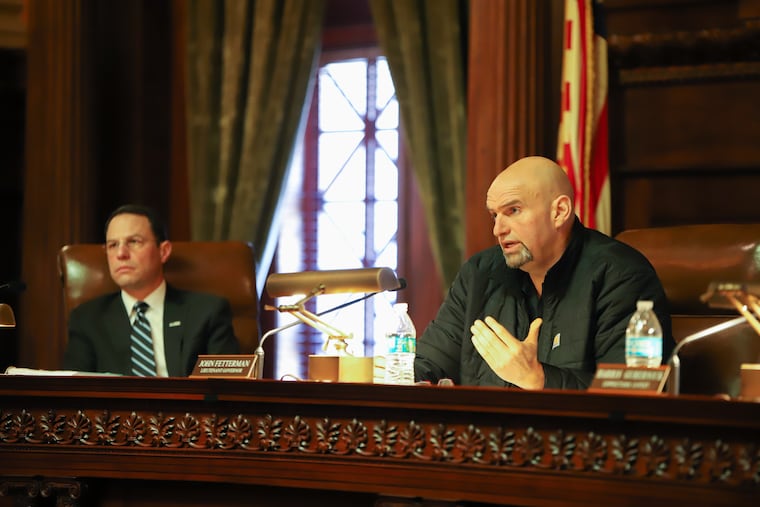Fetterman was vilified for promoting life sentence commutations, but research shows his approach is the right one
We should base our criminal justice policies on reliable data and not, as was the case in the U.S. Senate campaign, on raw appeals to fear.

The recent campaign for the U.S. Senate in Pennsylvania was marked by a highly contentious attack on John Fetterman’s role in rejuvenating a dormant commutation process for persons serving life sentences without parole. He was accused of releasing dangerous murderers at a time when there has been a spike in homicides in Philadelphia.
As is often the case on politically divisive issues, the rhetoric ignored reality. We understand the differing viewpoints on criminal punishment, but those beliefs cannot justify the intentional distortion of reform programs. There is strong empirical evidence that rigid life without parole sentencing in Pennsylvania does not provide for greater public safety. To the contrary, this practice has long resulted in disproportionate punishment, no greater public safety, and large economic costs to imprison older and nondangerous persons.
The great majority of states impose life sentences with the possibility of parole. For the crime of felony murder, where one can be convicted without causing or intending a death, Pennsylvania is one of only six states that have a mandatory sentence of life without parole for offenses other than intentional and deliberate first-degree murder.
In Pennsylvania, the only “safety valve” is commutation, which permits the governor to make persons eligible for parole. For the period of 1950 through the late 1970s, that process worked well, with the commutation of a majority of persons initially sentenced to life without parole, and no discernible impact on violent crime rates.
However, with the advent of the war on crime, governors in Pennsylvania rarely commuted life sentences, and a state constitutional amendment required an unanimous vote of the Board of Pardons for the governor to act. As a result, the number of persons serving life without parole and “virtual” life sentences of 50 or more years quickly increased to 8,242, a number higher than any other state other than Florida.
At the same time, the state prison population increased exponentially from about 7,500 in the late 1970s to 50,000 in 2019, even as the violent crime rates of the 1980s and 1990s were reversed. For the period 1979-2015, there was an average of only one commutation a year, which meant that almost all persons sentenced to life died in prison.
» READ MORE: From one victim’s family, a call to abolish life sentences for second-degree murder | Opinion
Did public safety require these extreme sentences and the virtual end to commutation? Two recent developments provide powerful evidence to the contrary. First, the increase in commutations generated by Fetterman as a member of the Board of Pardons, while very modest, has proven to be an absolute success. For the period 2019-2022, there were 40 commutations, and not a single person in this group has returned to prison for the commission of another crime.
Second, as a result of U.S. Supreme Court rulings that juveniles may not be sentenced to life without parole, in the past several years 269 juveniles who had served decades in prison were resentenced and released on parole. To date, only two have been rearrested on felony charges, a recidivism rate comparable with the nonprison population.
Similar results have been seen among federal prisoners granted early release from long drug sentences by President Barack Obama in the closing years of his administration.
These results were not a matter of luck. Fetterman made commutation a central issue of reform. With community and academic support, he encouraged applications from incarcerated persons deserving of commutation, and he established a more effective and reliable process in securing and presenting pertinent information to the Pardons Board.
Equally important, all persons released were provided with necessary transitional housing and social worker assistance with respect to employment and other crucial needs for those reentering society after so many years in confinement.
The same is true for the juvenile lifers. A coordinated effort of reentry support by the Juvenile Law Center, the Defender Association of Philadelphia, and other pro bono attorneys assisted in their becoming law-abiding and productive members of our community.
The recent election campaign focused on the increase in shootings and homicides in Pennsylvania. These troubling developments must be addressed with fair and effective law enforcement and attention to the root social causes of violence. We should base our criminal justice policies on reliable data and not, as was the case in the Senate campaign, on false claims of releases of dangerous persons and raw appeals to fear.
In the end, there is no reason why we cannot have fairness, equal treatment, and public safety. Gov.-elect Josh Shapiro, who served as a member of the Board of Pardons, should continue the commutation process, and the General Assembly should pass reform legislation providing for life with parole.
David Rudovsky is a senior fellow at the Penn Carey School of Law and a civil rights lawyer in Philadelphia. Kathleen M. Brown is a practice associate professor of nursing at the University of Pennsylvania.